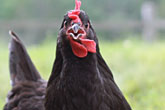Sustainable agriculture, heritage foods, and land preservation are the foundation of Woodland Farm.
Produce is grown using sustainable techniques, and livestock are given free-ranging living conditions and healthy, natural diets. The land is nurtured by removing invasive plants, encouraging the growth of native flora and fauna, and using winter cover crops in fields. Sustainable energy sources are also used – solar panels provide renewable energy to the mesonet and the chicken coop, while virtually all farm machinery runs on biofuel that’s produced on-site.
 Biofuel
Biofuel
Woodland Farm is home to Kelley Green Biofuel, a biofuel company that was started by farm manager Kristopher Kelley. In 2009 a biofuel processing facility was installed at Woodland Farm to convert waste cooking oil from Proof on Main into biodiesel that can be used by farm machinery. Today nearly all the farm’s engines run on biofuel.
 Heritage Foods and Livestock
Heritage Foods and Livestock
Prior to the advent of industrial farming, farmers raised thousands of different animal breeds and plant varieties. Today, however, much of that genetic diversity has been lost, as factory farms typically grow only a few specialized (often genetically-modified) types of livestock and crops. Woodland is trying to help restore that balance by raising several different heritage breeds of livestock, which are less harmful to the global ecosystem and more flavorful than factory-farmed breeds. Mulefoot and Hereford hogs and Egyptian Fayoumi chickens can all be found at the farm.

